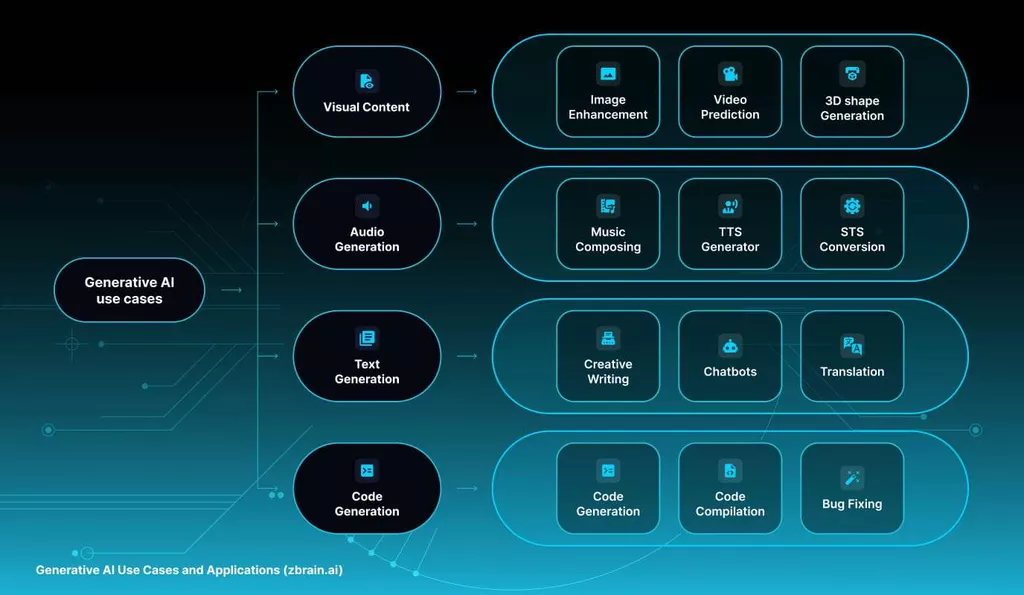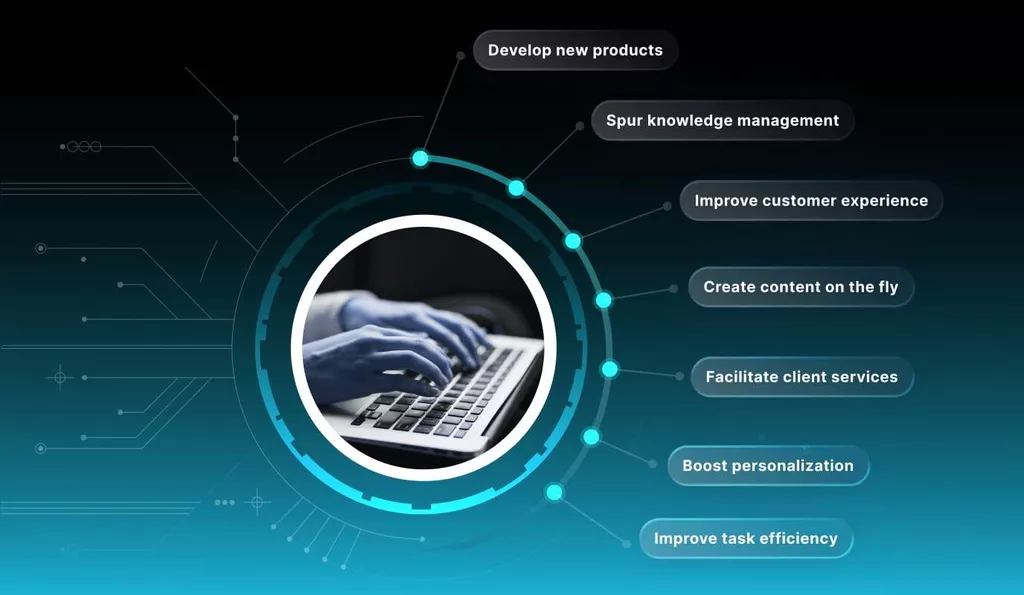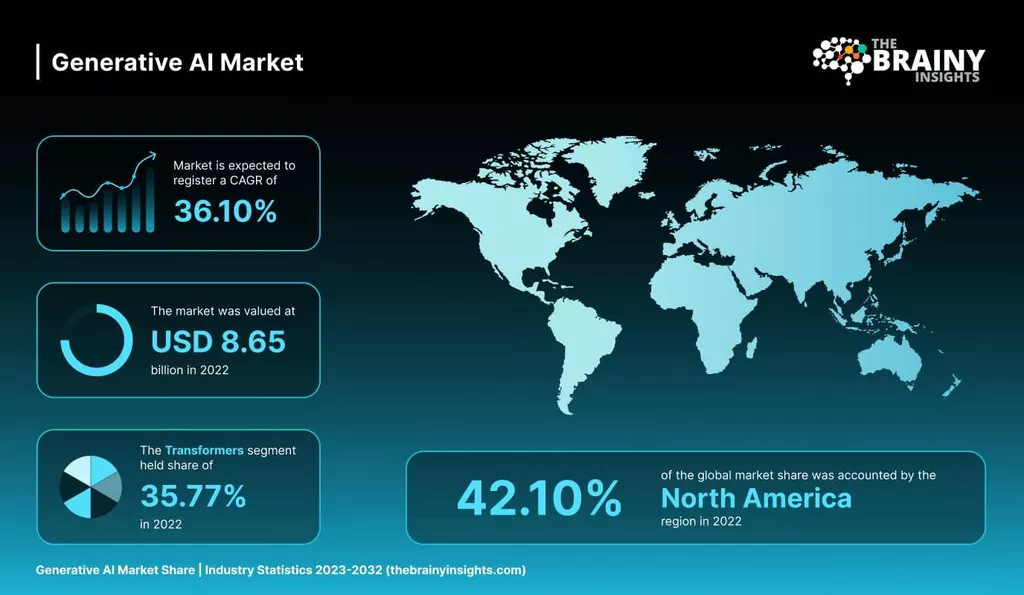The world of business is undergoing a significant shift, driven by digital advancements and automation. Technology is shaping the company’s performance in ways we’ve never imagined. As business owners, you’re standing at a crossroads – do you embrace the potential of groundbreaking innovations like AI technology or risk being left behind?
Studies indicate that by 2025, approximately 10% of the world’s generated data will stem from generative AI. Today big market players like Meta, Nvidia, DeepMind, Google, Adobe, and OpenAI have worked together with universities like MIT, Stanford, and UC Berkeley to make major advancements in this area.
Within our article, we will explore the prospects presented by generative AI for businesses. We’ll explore how it fuels creativity, streamlines processes, boosts customer experiences and accelerates new product development. Finally, you’ll have a clear understanding of how generative AI can be the driving force behind enduring success, navigating your business toward a future defined by technological excellence and strategic foresight.
Explaining Generative AI in Simple Terms
Generative AI is a cutting-edge technology that holds remarkable potential for transforming business. Imagine having an AI-driven creative powerhouse that can craft original content, whether it’s captivating marketing copy, eye-catching visuals, or even personalized music compositions. But how does it work, and what can it mean for your business?
At its core, generative AI learns from existing data to understand intricate patterns and relationships. Think of it as a digital artist studying a vast gallery of paintings, learning various styles, colors, and techniques. Once the AI comprehends these patterns, it can create entirely new content that matches with those learned characteristics.
As an example, in the realm of e-commerce, generative AI has the potential to assist in creating customized product descriptions. This ensures a unified and captivating communication approach for every item. Alternatively, if your goal is to elevate customer engagements, envision the utilization of AI-driven chatbots that provide immediate and pertinent responses to inquiries. This not only heightens customer satisfaction but also lessens waiting time. Look at its basic use cases:

It’s also used in areas like drug discovery, where it can propose new molecular structures, and in creating realistic video game environments. The technology’s ability to bring novelty and creativity to problem-solving makes it an exciting area of AI research and development.
Governance Matters
Generative AI is governed through a combination of ethical frameworks, industry standards, regulations, and responsible practices put forth by various stakeholders.
At its core are ethical guidelines that promote fairness, accountability, and transparency. Organizations like OpenAI and IEEE have established principles to ensure AI serves humanity’s best interests. Regulatory bodies also play a role, overseeing areas like data privacy and consumer rights.
Transparency is another key element. Developers strive to make AI systems understandable, explaining how they work and why they make certain decisions.
Human oversight ensures AI stays on track. Reviewers monitor outputs, refining the AI’s responses and preventing inappropriate content. Data privacy and security are fundamental, ensuring personal information remains protected.
By continuously auditing AI models and engaging various stakeholders, including developers, ethicists, and users, we’re working together to foster a responsible and beneficial AI landscape. It’s about nurturing AI’s potential while safeguarding the values that matter most.
How Can AI Help My Business?
Generative AI for business offers several valuable benefits, enhancing creativity, personalization, and efficiency across various aspects. Here are some ways gen AI assists your company:
- Content-Related Matters: The technology helps produce engaging content for marketing, social media, and branding purposes. For instance, it can generate unique blog posts, social media captions, or even entire articles based on your business’s niche and style.
- Personalized Marketing: Modern tools can analyze customer data to create personalized marketing materials. It could automatically tailor email campaigns, suggesting products or services based on customer preferences and buying history.
- Customer Support: In customer service, generative AI for business can deliver quick and contextually relevant responses to common inquiries. For instance, it could provide prompt answers to frequently asked questions on your website or through chatbots.
- Product Recommendations: E-commerce businesses can benefit from product recommendations. By understanding customer behavior and preferences, AI tools offer products that customers are likely to be interested in, boosting sales.
- Data Augmentation: In data-heavy fields like machine learning, generative AI is able to create synthetic data to expand training datasets. This will improve the performance of AI models, especially when real data is scarce.
- Interactive Experiences: In sectors like gaming and entertainment, gen AI helps to create dynamic and interactive experiences. Games could feature characters that respond intelligently to player actions, adapting the gameplay in real-time.
- Language Translation and Localization: Generative AI can help translate content accurately and quickly, aiding businesses in reaching a global audience. It also assists in adapting content to different cultural contexts.
Generative AI offers multifaceted benefits across industries. It’s not just about automation; it’s about elevating creativity, efficiency, and customer satisfaction in a way that transforms the way businesses operate. Look at the basic benefits of generative AI for business below.

The capacity of generative AI to create unique and personalized results can provide your business with a competitive advantage. It can enhance customer involvement and optimize numerous operations, leading to enhanced efficiency and innovation. If integrating AI technology to fortify your company is your aim, adhering to an implementation strategy is crucial. We’ve prepared a guide on how to prepare your business for AI to simplify this journey for you.
Demanded Generative AI Models
Put simply; these models are advanced systems that possess the remarkable ability to create unique content by learning patterns and structures from existing data. They belong to the broader field of artificial intelligence and are specifically designed to generate diverse types of content.
One common approach used in generative AI is the utilization of neural networks, complex mathematical models inspired by the interconnected structure of neurons in the human brain. These networks learn from vast datasets and leverage this acquired knowledge to generate content that mirrors the data’s characteristics. For example, a generative AI model trained on a collection of poems could produce new poems that mimic the style and themes it learned during training, even though the generated poems are entirely original.
We prepared the list of the most demanded options:
- Text (GPT-3, 4): Produce human-like text based on a given prompt. They are used to writing articles, creating conversational agents, composing poetry, and even generating code.
- Images (StyleGAN): Draw illustrations from scratch, often producing realistic faces, artwork, or even fictional creatures. They’re used in the art, design, and entertainment industries.
- Language Translation (Seq2Seq): Translate text from one language to another, improving cross-cultural communication and enabling global business operations.
- Content Summarization (BART): Read lengthy articles or documents and generate concise summaries, aiding in content curation and information retrieval.
- Textual Descriptions for Images (DALL-E): Generate textual descriptions of images, enhancing image search and accessibility for visually impaired individuals.
- Video Game Environments (Procedural Generation): Some video games use generative AI to create dynamic and ever-changing game environments, providing players with unique experiences each time they play.
- Drug Discovery (GANs): Generative AI can propose novel molecular structures for drug development, potentially accelerating the discovery of new medications.
Generative AI models have found applications in numerous fields, including art, design, entertainment, healthcare, and more. They create realistic images, compose music, generate human-like text, and even simulate complex scenarios. These models have the potential to revolutionize industries by providing creative solutions, enhancing automation, and pushing the boundaries of what AI can achieve.
Addressing Risks Associated with Generative AI
Like any technology, it comes with potential biases and risks that need to be addressed. The first challenge refers to bias in training data. Generative AI business models learn from large datasets, which may inadvertently contain biases present in the data. If the training data is biased, the generated content could also reflect those biases. For instance, text generated by AI might inadvertently reinforce stereotypes or prejudices present in the training data.
Another potential problem lies in fairness and inclusivity. It’s crucial to ensure that AI-generated content is fair and inclusive. Efforts should be made to train models on diverse and representative datasets to minimize the propagation of biases and avoid alienating or misrepresenting certain groups.
As AI generates content autonomously, there’s a potential loss of control over what’s produced. This can lead to unexpected and undesirable outcomes, requiring mechanisms to ensure the content aligns with intended objectives.
Addressing these concerns requires a multi-step approach:
- Diverse Training Data: Ensuring datasets used for training are diverse, representative, and free from biases is crucial to mitigate biased outputs.
- Algorithmic Audits: Regularly auditing AI models for biases and fairness can help identify and rectify potential issues.
- Transparency: Developers should be transparent about the capabilities and limitations of their AI systems, so users understand that the content is generated by a machine.
- Ethical Frameworks: Organizations should adopt ethical guidelines for AI development and usage, considering the potential impact on society and individuals.
Finally, introducing human oversight in content generation can help ensure the outputs align with ethical standards and intended objectives.
Showcasing real-world examples of leveraging Generative AI in Business
Companies are leveraging generative AI across various functions to drive efficiency, innovation, and customer engagement. Here are some examples of how they are using the technology:
- Content and Marketing: Business owners implement generative AI to automate marketing content writing. This includes generating social media posts, marketing materials and email campaigns. Platforms like Writesonic and Copy.ai assist in quickly producing engaging content that resonates with the target audience.
- Customer Support and Chatbots: Generative AI-powered chatbots are a popular choice for business leaders to provide instant responses to customer queries. These chatbots handle routine inquiries, freeing up human support agents for more complex interactions. Intercom’s Resolution Bot is an example of a chatbot that offers accurate and timely customer support.
- Product Development and Prototyping: In industries like manufacturing and automotive, business leaders employ generative AI to optimize product designs. Autodesk’s generative design tools offer design suggestions based on input parameters, leading to innovative and efficient product prototypes.
- Personalized Customer Experiences: Business leaders utilize generative AI to deliver personalized experiences to customers. E-commerce platforms like Amazon and Netflix use AI algorithms to recommend products and content based on user behavior and preferences, enhancing customer satisfaction and engagement.
These examples illustrate how businesses are strategically integrating generative AI to streamline operations, enhance customer experiences, and foster innovation across diverse industries and functions.
Experts’ View on the Prospects of Generative AI for Business
As technology advances, the capabilities of artificial intelligence in business are poised to revolutionize the way companies operate and innovate. By the year 2030, the generative AI market will reach $15.7 trillion, with an expected increase in CAGR of 36.10%.

Experts believe generative AI will continue to evolve, providing a positive impact of artificial intelligence on business. Driven by advancements in deep learning and neural networks, AI-generated art, music, and literature could become more immersive and creative.
As generative AI models become more versatile, they are expected to break down barriers between different creative domains. This means AI systems might be capable of generating artworks, music, and text seamlessly, enabling collaborations that blend various forms of expression.
As AI-generated content becomes more prevalent, experts emphasize the need for clear ethical guidelines and regulations. Ensuring proper attribution, addressing copyright issues, and avoiding misuse of AI-generated content are crucial areas that need attention.
In this future scenario, businesses have at their disposal advanced AI tools that excel in content creation. Whether it’s drafting marketing materials, generating product descriptions, or crafting engaging social media posts, generative AI becomes a trusted resource for creating high-quality content efficiently. Marketing teams collaborate seamlessly with AI systems, enabling them to keep up with the growing demand for diverse and compelling content.
Customer support evolves into a new realm of efficiency and accessibility. AI-powered chatbots, powered by advanced generative models, offer instant and accurate responses to customer queries. These chatbots understand context and nuances in human language, making interactions feel natural and engaging. As businesses integrate these AI-powered solutions into their customer support strategies, response times shorten, and customer satisfaction soars.
Improve your business with MetaDialog
In a world where customer support defines the success of a business, the transformative potential of generative AI is a beacon of opportunity. As business owners and top management, you have a unique chance to harness this innovation and take your customer interactions to the next level.
The future of customer support is dynamic, responsive, and powered by AI. With MetaDialog solutions, you’re not just adopting a conversational platform; you’re embracing a new standard of customer engagement. The days of routine inquiries bogging down your team are over, replaced by efficient, AI-driven interactions that leave a lasting impact.
Are you ready to embrace the future of customer support, guided by the prowess of generative AI? Let’s take the first step together. Book a demo with MetaDialog solution today and experience firsthand how this transformative technology can redefine the way you connect with your customers. Elevate your support service, empower your team, and embark on a route where AI and human ingenuity meld seamlessly.
